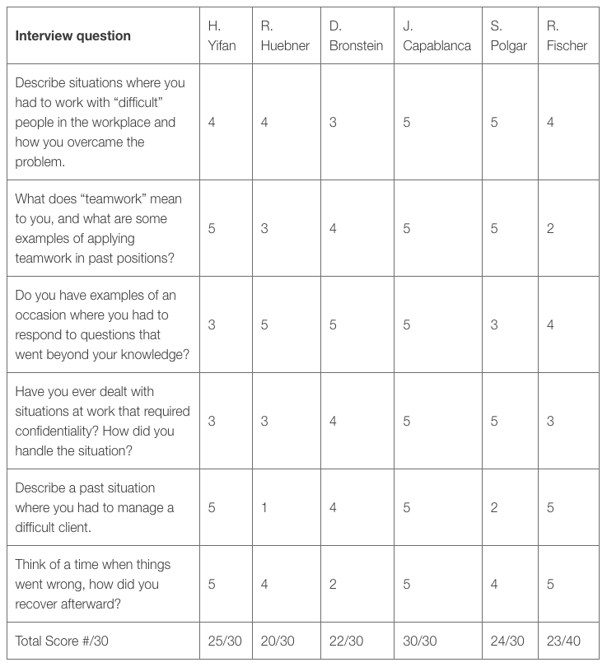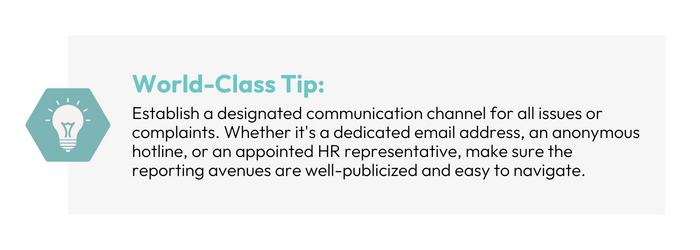Know The Legal Landscape
Staying on top of the legal landscape is not just a recommendation; it's imperative. HR leaders must understand and stay up to date with local, national, and industry-specific laws to conduct productive and legally sound interviews.
Resources to Stay Informed
- The U.S. Equal Employment Opportunity Commission (EEOC) website: This is a federal agency that enforces employment discrimination laws. Their website has a wealth of information on conducting compliant interviews, including a list of prohibited interview questions.
- U.S. Department of Labor: offers valuable guidance on various aspects of HR compliance, including wage and hour laws, workplace safety, and hiring practices. HR leaders can find essential resources to help them remain legally compliant.
- The Society for Human Resource Management (SHRM): SHRM is an organization for HR professionals that offers a variety of resources for conducting compliant interviews, including training materials and webinars.
Major laws and regulations for interview compliance
Age Discrimination in Employment Act (ADEA): The ADEA prohibits age discrimination in employment, including hiring, promotion, and layoffs. This law ensures that age is not a determining factor in interview decisions.
Americans with Disabilities Act (ADA): Employers must provide reasonable accommodation to ensure that candidates with disabilities have an equal opportunity to participate in interviews and demonstrate their qualifications.
Equal Pay Act: Employers must provide equal compensation for equal work regardless of gender. During interviews, employers must ensure that discussions about salary and benefits adhere to this law to prevent gender-based wage disparities.
Title VII of the Civil Rights Act: Title VII prohibits employment discrimination based on race, color, religion, sex, or national origin. It impacts the interview process by ensuring that questions and decisions related to these protected characteristics are fair, unbiased, and compliant with the law.
These are just a few laws impacting the interview process. Make sure to consider all local laws that affect the hiring process.
Standardize Interviews & evaluation process
Establishing standardized interview protocols ensures consistency and fairness throughout the hiring process. This minimizes the risk of introducing bias or discriminatory practices into the interview process.
Develop a list of pre-approved interview questions
Create a list of questions your hiring team can reference before and during the interview process. These questions should be directly related to the job requirements and avoid personal or intrusive questions that could potentially lead to discrimination claims.
It’s also a good idea to provide your interviewers with a list of questions they can't ask. This should include questions about protected characteristics as well as topics deemed taboo, including:
- Marital or family status
- Gender, Sexual Orientation, Race, Religion or Political Affiliations
- Criminal history
- Medical history
This can reduce the chance of asking inappropriate or uncomfortable questions.
Set Objective Evaluation Criteria
Interviewers may have varying standards and interpretations of candidate performance, leading to inconsistent assessments and potential bias in the interview process. To ensure consistent and objective evaluations, your team should establish criteria focusing only on skills, work experience, competencies, and behaviors relevant to the position.
Using a candidate score sheet is one way to avoid relying on subjective impressions. This method involves a grading system using scores (1-10) to grade candidates based on their answers, credentials, and experience. The scorecard should include a section for additional comments and a total score.
Here is an example of what a scorecard could look like:

Consistency Across the Board
Ensuring that every candidate interviewing for the same position is subject to the same process, questions, and evaluation criteria is essential. Any deviations from the standardized process you establish should be well documented.
Interview Documentation & Record Keeping
Documentation protects both candidates and organizations. It provides a clear record of the interview process, making it possible to defend decisions, if needed, and ensuring that all parties involved are treated fairly and equitably.
Consider adding the following components to the list of items in your document:
- Candidate information: Name, contact information, and position applied for
- Interview Panel: Names of the panel members
- Interview questions: record all questions asked during the interview
- Candidate responses: document the candidate’s answers and include any specific details or examples provided
- Assessment and evaluation: document ratings or scores assigned to the candidate (this is a great time to leverage the score sheet referenced above).
- Reference checks: document results or insights gained if reference checks were conducted.
- Decision and rationale: explain why the selected candidate was chosen over others.
- Feedback to candidates: Keep a record of any feedback provided, whether they were selected or not.
Ensure Data Privacy
Collecting and processing candidate information during interviews can be a potential challenge if not handled correctly. HR leaders must ensure their record and data-keeping practices adhere to protection regulations:
- Obtain informed consent: inform candidates of the collection, use, and storage of their personal data.
- Limit data collection to the essentials: collect only the information directly relevant to the hiring and decision-making process, avoiding unnecessary personal details.
- Protect data security: implement robust measures to safeguard candidate information, such as interview platforms and secure networks.
- Retention and deletion policies: Most employers are required to retain applicant data for at least one year after the application was submitted. This varies from state to state, make sure to check with your local policies.
Reporting and Escalation Procedures
Encourage candidates and interviewers to communicate openly if they encounter issues during the interview process. It's essential to create an environment where individuals feel safe and empowered to report any concerns. Emphasize that their feedback is valued and will be treated confidentially and sensitively. 
Escalation processes vary greatly by organization, but in general, they should include steps for investigating complaints, taking appropriate actions, and communicating outcomes to all parties involved.
Equip Your Teams to Conduct Compliant Interviews
Once you've established a standardized interview process, you must thoroughly train your team of interviewers on best practices .
Invest in Comprehensive Training
Training programs should be integral to onboarding interviewers to ensure they are fully aware of your process and conduct compliant interviews. These are some of the primary training programs you can consider:
Interview process training: This training session should walk interviewers through every step of the interview process as well as the best practices established in the previous section (relevant laws, illegal interview questions, evaluation criteria, etc.)
Scenario-based training: During this session, interviewers are presented with hypothetical situations related to potential legal and ethical dilemmas during interviews. These exercises provide an opportunity to practice responding appropriately.
Diversity, equity, and inclusion training: DEI (diversity, equity, and inclusion) training can help interviewers understand the importance of creating an inclusive interview environment. This training should emphasize the benefits of a diverse workforce and strategies to reduce bias during the interview process.
Mock interviews: Mock interviews provide a hands-on experience in a controlled environment. They can help identify any potential biases or inappropriate questions that need correction.
Training Guides
Develop a comprehensive interview training guide that serves as a valuable reference for your team. This guide should include all the information outlined in your standardized interview process and the relevant topics from the training sessions mentioned above.
Labor laws and regulations are subject to change. Establish a process to update your training guides with additions or changes that may impact the interview process.
Conduct Regular Audits and Reviews
Periodically audit your interview and evaluation processes to identify areas for improvement. Establish a feedback loop with interviewers and candidates to gather insights on their experiences and challenges related to compliance. Use this feedback to fine-tune your audit process and training programs.
When in doubt, consult with legal experts who specialize in employment law. They can guide you on compliance issues and ensure your interview process adheres to all applicable laws and regulations.
By embracing these best practices, staying up to date with regulations, and fostering a culture of transparency, HR leaders can ensure their organizations conduct compliant and fair interviews.





